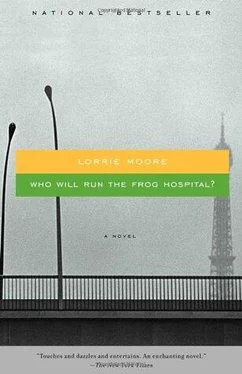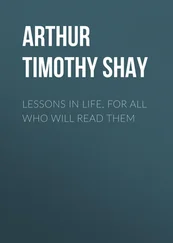“Is Sils here?” I asked through the screen.
“Little Sils?” he repeated, mockingly, lightly, as if both she and I were small, amusing mammals. “Sure,” he said, and without opening the door himself, he simply turned and bellowed, “Sils! Your friend’s at the door for you!” and went back down into the cellar, from which came the steady, whining rock of a guitar solo, then the deep beat of the electric bass, vibrating the windows, frame and sash, straining the glass. It was good the Chaussées lived next door to a cemetery.
Sils came down the wide, gray-painted stairs of their house. “Hi!” she said, and out of the blue gave me a hug. “Are you hungry? I’m starved,” she said.
“Sure,” I said, determined, always, to be helpful. We went into the kitchen and hunted around. Her mother hadn’t gone grocery shopping in weeks and there was nothing to make a salad or a sandwich with, and so we did as we often did: contented ourselves with raw potatoes, oleo, and salt — the potatoes cut in quarters and peeled, a meal of sororal resourcefulness. We sprinkled them with salt and spread difficult gobs of margarine along the edges. It was, in fact, a snack I loved: the cold bright fat of the Parkay, the apple-cool of the potato; our teeth gliding silently in, then noisily executing the bite through the potato. The damp crunch held a kind of comfort for me, the salt rubbing grainily against my gums. We ate raw potatoes a lot at her house — both in her room upstairs and at the beat-up aluminum dinette set in the kitchen.
This time we took them upstairs. We sat around a whole plate of them, on her rug, and felt mildly, mockingly bored by our own self-sufficiency. The afternoon was sunny and the light was angled already, spilling through the lattice outside her window, forming diamonds on the wall.
“Diamonds,” I said. “Not my best suit.”
“Hearts. I like hearts.” She looked a little tired.
“How are you feeling?” I asked.
Sils lit up a cigarette. “Not so bad. I had cramps, but they’re over.”
“That’s good. Can I bum a smoke?”
Sils handed over a cigarette. A look of anguish passed over her face. “You’ll never guess what I found.”
“What?” I filled my lungs with smoke, but felt it best, most comfortingly around my tongue and teeth.
Sils gulped a little and winced. “A piece of purple skin in my underwear,” she said.
The confused and stricken girl’s face that had spilled forth this phrase, her eyes grappling with mine in a panicked way, made me moan and turn aside.
“Oh, god,” I said. And then, not knowing what else to say, I said, “When?”
“This morning,” she said. She blew smoke out through her nostrils, then stubbed her cigarette out in the ashtray, took up a chunk of raw potato, and bit into it.
“Well, at least it’s all over,” I said. Joni Mitchell was keening “Little Green” on Sils’s record player. Sils listened to that song all the time now, like some woeful soundtrack. The soprano slides and oos of the the song always made us both sing along, when I was there. “Little green, be a gypsy dancer.” Twenty years later at a cocktail party, I would watch an entire roomful of women, one by one and in bunches, begin to sing this song when it came on over the sound system. They quit conversations, touched people’s arms, turned toward the corner stereo speakers and sang in a show of memory and surprise. All the women knew the words, every last one of them, and it shocked the men.
“Now, where were we?” everyone said when the song was over.
“You don’t really like Mike, do you?” Sils asked now.
I felt caught. “I don’t know,” I said.
“Come on,” she said. “You can tell me.”
“It’s just that … I don’t know. He has no texture .”
“He’s got texture,” said Sils. “You’ve just got to beat it out of him.” She lit up another cigarette. “Which, I realize, you shouldn’t have to do with texture.”
“No,” I said. “Not really.”
Sils’s eldest brother, Skip, the band’s drummer, pulled up in the driveway, noisy and elegant in his way. Just back from Canada, too, he was in and out of the band; he also popped pills in the kitchen, looking at the clock, glugging white and red tablets down with beer. He had his girlfriend Diane with him. When the girlfriends were there, they and Sils’s brothers took over the house, lying on top of one another on the living room sofas, kissing and rubbing and napping.
“Let’s get out of here,” said Sils, hearing Skip downstairs. She was working a late shift and didn’t have to leave for an hour. Mike was picking her up. “Let’s go for a walk.” So we did. We left her house and walked around in the park, looking for arrowheads and puffballs, until it was time for her to go.
The next day at Storyland was slow — a warm drizzle keeping people away — and at about five o’clock Mike Suprenante drove up on his Harley. He took off his helmet and glided his motorcycle up to my register.
“Would you like a ticket, monsieur ?” I tried to be funny, friendly, but I sounded full of hate, even to my own ears.
“I want to see you alone to talk about Sils.”
I looked at him, trying to let nothing show. I felt secretly pleased. He had, with this request, acknowledged I was her guardian, her confidante, closer to her than he.
“When can we do that?” he asked sternly.
I felt powerful. “I don’t know. Tonight, maybe.”
Herb, the manager, came up and stood behind the ticket tearer’s gate. “Get that thing outta here,” he said angrily, in the direction of the motorcycle.
Mike started to back it up, slowly.
“You’d better move faster than that,” said Herb. “We can’t have vehicles in the main entrance of the park.”
Mike looked at me. “Ten o’clock. Out front here,” he called out. “Ça va?”
“Yeah,” I said, my voice hickish and tough.
Mike glided backward, then turned, started up his bike, and left. Herb came through the gate, then just stood next to me, frowning. I stood there, saying nothing, shifting my weight from one hip to the other.
“What?” I said finally, impudently.
“No more pals” is all he said. “No more.” And then he smiled falsely, a grimacing stack of teeth, and walked pompously away.
“Do you want to go have a drink?” Mike asked me at closing time in front of the main gate to Storyland. It had stopped raining and the night sky had cleared. There was a bar down the road called Fort Ress, owned by a guy named Dickie Ress, and Mike liked to go there. Or there was the Sans Souci.
“All right,” I said.
“Wanna go to the Ress?”
“OK.”
“Wanna hop on?”
“No. I’ll walk.” It was a five-minute walk past the public beach to the Ress.
“Whatever,” said Mike. He grinned. “I’ll get us a good table out on the patio. The one with the least bird turd.” He grinned again.
I narrowed my eyes. “Promises, promises,” I said. No matter what the situation, a sarcastic tone was a Horsehearts girl’s best response.
Mike winked and roared off ahead. “The vroom-vroom gene,” Sils had said the day the exhaust pipe on Mike’s Harley burned a scar into her leg. “All boys are born with it. Vroom-vroom .”
I trudged up the road. It was after ten o’clock at night, and the sky was still a bluish color and peepers sang from the trees in the park. A frog chorus. The frogs sing for no reason and so do we went a line from a poem I had learned in school, and I imagined these frogs now scattered through the woods, their tiny eyes lit like chips of emerald, while their pumping whistle-chant — part summons, part yearning lullaby — piped through the night. Whoops, wope, who-wopes . I felt accompanied, guarded, by the throb and thrum of it, as I hiked along the beach road up toward the lights of Marvy’s Miniature Golf, where, when I got there, I could no longer hear the peeping — only bar noise and golfers in wide-lipped hats.
Читать дальше












